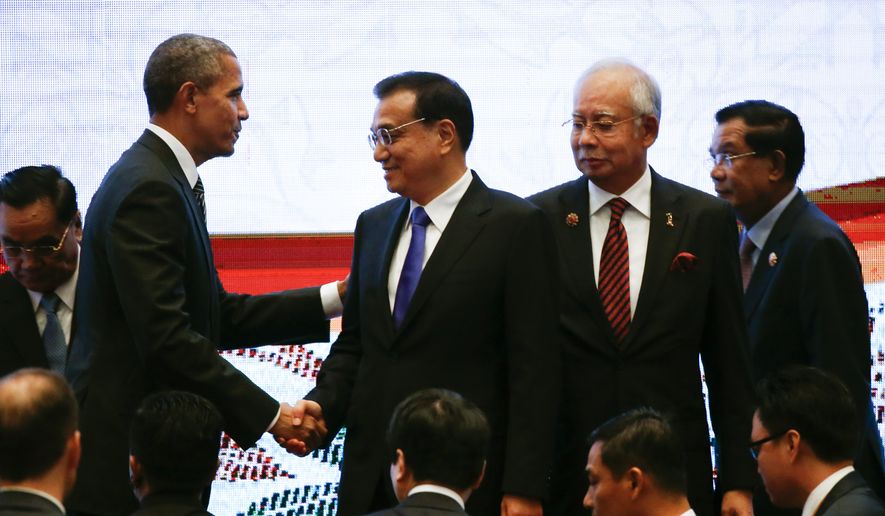As he hosts Southeast Asian leaders at a two-day summit starting Monday in California, President Obama is under increasing pressure to stand up for human rights with some of his repressive guests.
Mr. Obama has invited the heads of Thailand, Brunei, Cambodia, Malaysia and six other countries for the first Association of Southeast Asian Nations (ASEAN) meeting to be held in the U.S. It’s an effort to burnish his foreign policy legacy of shifting America’s attention to the Asia-Pacific region, including a massive free trade deal.
But the invitations have raised criticism that Mr. Obama is granting legitimacy to dictators who resist democratic reforms, when the president should be offering incentives to improve their human rights records.
“President Obama knows that human rights are under assault in Southeast Asia; the question is whether he’s going to say or do something about it,” said John Sifton, Asia advocacy director at Human Rights Watch. “The risk is that the summit will empower and embolden ASEAN leaders who have been responsible for jailing journalists, cracking down on peaceful protesters and dismantling democratic institutions after coups.”
Ben Rhodes, the White House deputy national security adviser, said the administration “of course supports universal values related to freedom of expression, freedom of speech, the ability of civil society to organize and be productive in different countries.”
“Of course, the president will be lifting up the need for good governance, the rule of law, accountable institutions, and not just in ASEAN but around the world,” Mr. Rhodes said.
Among the worst offenders at the summit, say human rights advocates, are Cambodian Prime Minister Hun Sen, an autocrat who has ruled the country since the 1980s and has been shunned by previous administrations from setting foot on U.S. soil. In a new report, Human Rights Watch said the former Khmer Rouge commander has a record of “violence, intimidation, and politically motivated arrests and prosecutions against all perceived opponents, while allowing high-level corruption and cronyism to flourish.”
The sultan of Brunei, Hassanal Bolkiah, one of the world’s richest men, with an estimated net worth of $20 billion, “has imposed a near complete ban on freedoms of expression, association, and assembly,” Human Rights Watch said. “He plans to increase the imposition of Islamic law punishments, including whipping and stoning, for adultery, sex between unmarried persons, and homosexual activity.”
Malaysian Prime Minister Najib Razak is implicated in a massive corruption scandal in which nearly $700 million found its way into his bank account. He claimed it was an entirely legal “personal donation” from Saudi Arabia’s royal family. He also has engaged in a crackdown on political opponents, civil society groups and the media.
Vietnamese leaders also will attend the summit, a month after Communist Party leaders chiefs selected the country’s next leaders without any semblance of a democratic process. Bloggers critical of the Vietnamese government are being jailed.
The presence of Thailand’s prime minister, Gen. Prayuth Chan-ocha, is “especially troubling,” the report said. “Prayut, who regularly threatens critics with violence and asserts that his decisions are unchallengeable, has repeatedly delayed a return to civilian democratic rule,” Human Rights Watch said.
Despite the dismal human rights records of the participants, Mr. Obama is fostering partnerships with them for cooperation on economic and security priorities, including a united front against China over maritime jurisdiction questions in the South China Sea, a major shipping route. The U.S. also wants their cooperation on counterterrorism efforts, and is linking up with several ASEAN countries in the Trans-Pacific Partnership (TPP) trade deal.
House Committee on Foreign Affairs Chairman Edward R. Royce said the TPP will not get over its final hurdles “without strong, focused leadership from the White House.”
“As we look to advance trade and growth, we must also seek greater respect for human rights,” said Mr. Royce, California Republican. “Too many in Southeast Asia are denied basic freedoms. The Obama administration must use its influence to press for serious reforms and inspire those that peacefully seek democracy and fundamental rights. Remaining silent on this front would be inexcusable.”
The White House said Friday that the U.S. is helping through its beefed-up participation in ASEAN to promote improved human rights in those countries.
“The United States strongly supports ASEAN’s effort to realize a ’rules-based’ community that serves the people of ASEAN and ensures human rights and fundamental freedoms, including by helping ASEAN integrate international human rights standards into legislative and judicial processes,” the White House said in a fact sheet on the summit.
The summit will include discussions of the Trans-Pacific Partnership, the free trade deal that Mr. Obama hopes will be the economic foundation of his foreign policy “pivot” toward Asia. ASEAN members Vietnam, Singapore, Brunei and Malaysia are partners with the U.S. in the TPP, which the member nations signed last week. Mr. Obama is urging Congress to approve the trade agreement, which is opposed by Democratic lawmakers.
A coalition of progressive advocacy groups opposed to the TPP plan to protest the summit site at Sunnylands, near Palm Springs in Southern California. Mr. Obama spent the weekend golfing in Palm Springs after attending several Democratic fundraisers in California.
• Dave Boyer can be reached at dboyer@washingtontimes.com.




Please read our comment policy before commenting.